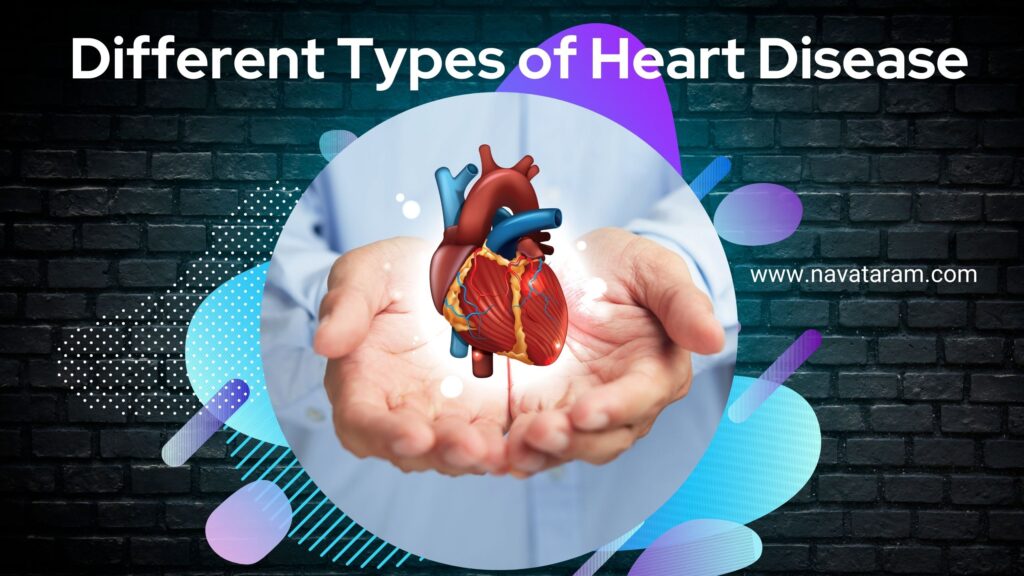The heart, or the lungs of the body is muscle organ that circulates circulation of blood through the entire body in order to provide the body with oxygen as well as nutrients. There are a variety of types of heart disease and the symptoms differ based on the condition. Those Types of Heart Disease. Certain kinds of heart diseases can cause chest pain, or sensations of heavy or pressure while other causes fatigue and shortness of breath. Certain diseases are genetic and can’t be prevented however, others can be managed through a healthy diet and lifestyle. Those Types of Heart Disease.

9 Types of Heart Disease?
1.Coronary Artery Disease (CAD)
This is the most prevalent form of coronary heart disease. It happens when the arteries that carry blood flow to the muscle of your heart get more narrow and hardened because of the buildup of cholesterol as well as other substances (plaque) in their wall. This could cause heart pain (angina) as well as heart attacks, and other issues.
2.Heart Valve Disease
This happens when any of the valves in the heart fail to function correctly. The valves might not open completely (stenosis) or close correctly (regurgitation or insufficiency) which can cause disruption to flow of blood throughout the heart.
3.Cardiomyopathy
It refers to the diseases in the cardiac muscle. There are a variety of types that include dilated cardiomyopathy (enlarged the heart muscle) hypertrophic cardiomyopathy (thickened heart muscle) or restrictive cardiomyopathy (stiff heart muscle).
4.Heart Arrhythmias:
Arrhythmias can be described as abnormal heart rhythms which can be caused by scarring the heart muscle, medication or other reasons. They can lead to chest discomfort, fatigue, or the sensation of a fluttering in the chest (palpitations). The most commonly reported form of heart condition is arrhythmias. It is also essential to know the risk factors associated with heart disease. These are the things that increase your chances of having an issue with your heart. Certain of these risk factors are easily controlled like taking a low-fat diet, avoiding saturated fats, avoiding smoking cigarettes and working out regularly. Some risk factors aren’t manageable, like high blood cholesterol, high blood pressure and overweight. If you suffer from a heart condition, your physician will assist you in treating it by suggesting modifications to your lifestyle or giving medications.
5.Congenital heart disease
The heart defects that are present at birth. They may affect the structure of the heart, its function or both. For instance, septal deformities (holes in the walls of the heart) as well as coarctation of aorta, as well as tetralogy of Fallot.
6.Pericardial Disease
This can be caused by inflammation or other issues with the pericardium the sac that covers the heart. It can be caused by pericarditis (inflammation) and the pericardial effusion (fluid buildup) or constrictive pericarditis (thickening and tightening of pericardium).
Description:- Inflammation of the pericardium, a thin sac-like skin that surrounds the heart.
Signs :-Acute symptoms of chest pain and fever and feelings of fatigue or weakness.
Sources: Cleveland Clinic, Mayo Clinic
7.Aortic Disease:
These are conditions that affect the aorta. It is the largest vein that is responsible for carrying circulation of blood between the heart and the other organs. An example is aortic aneurysm (bulging in the aorta) and dissection of the aorta (tear in the wall of the aorta).
Description:- An aneurysm an infected wall that surrounds the aorta. This is the main blood vessel that carries circulation of blood between the heart and the human body. Dissection occurs when the lining of the aorta ruptures.
Signs:- Acute, sudden lower back or chest pain Loss of consciousness and breath shortness.
Sources: –Mayo Clinic, Cleveland Clinic
8.Rheumatic heart disease
It is caused by damaged heart valves that are caused by rheumatic illness, an inflammation-related disease that may occur following a strep thrush or scarlet fever.
9.Myocardial infarction (Heart Heart Attack)
This occurs when the flow of blood to a portion in the heart becomes restricted for a prolonged period of duration that the heart muscle gets injured or even dies. It is usually due to CAD.
Knowing the different forms of heart disease can assist in recognizing the signs early and pursuing appropriate treatment. For more information on the subject you can refer to medical sources like those from the Mayo Clinic, Cleveland Clinic as well as the American Heart Association.
Read This Article:-
“Essential Vitamins And Minerals For Optimal Health”-2024
How To Grow Hair Naturally-Natural Home Remedies (5 Tips)